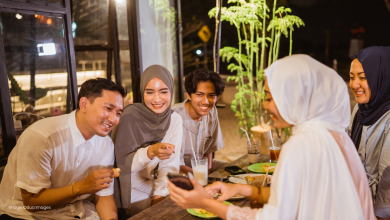
With the growing Muslim population in Japan, the number of international visitors is also on the rise. In the first half of 2024 alone, Japan welcomed over 17 million international travelers, making its status as a popular destination for Muslim tourists.
While they are not predominantly Muslims, Japan has become a popular destination for Muslim travelers due to its efforts to provide Halal foods and services. Places in Japan like Tokyo become a major attraction for Muslim visitors due to their increasing Halal food options.
In an effort to cater to the influx of Muslim tourists, they aim to create a more inclusive environment for Muslim travelers. Here is what they offer for the Muslim travelers:
1) Halal Certified Meal Options
Japan has made it much easier for Muslim tourists to enjoy their trip while respecting their dietary needs. Many restaurants now offer halal-certified meals. This is thanks to efforts by groups like the Japan Halal Association. For example, Muslims can try delicious halal ramen at Ayam-Ya or even enjoy Japan’s famous Kobe beef at select halal-friendly outlets like Halal Kobe Beef COORIN in Osaka, Japan. When these outlets are selected,
Japan has significantly improved its hospitality for Muslim tourists, making it easier for them to enjoy their trip while adhering to their dietary needs. Many restaurants now offer Halal-certified meals, thanks to efforts by organizations such as the Japan Halal Association. For instance, Muslim travelers can savor delicious Halal ramen at Ayam-Ya or experience Japan’s renowned Kobe beef at select Halal-friendly establishments like Halal Kobe Beef COORIN in Osaka.
Shopping has also become more convenient, with stores stocking halal-certified snacks and souvenirs. In Osaka, you can even find a special halal snack box, perfect for tourists looking to take a bit of Japan home without worrying about dietary restrictions. These thoughtful changes make exploring Japan’s food culture both enjoyable and inclusive for Muslim visitors.
Food delivery for Halal food is also available for Muslim consumers who want to enjoy meals without having to go outdoors. Options like Taste & Discover Japan offer Halal bento deliveries, making it easier for Muslims to enjoy meals that align with their dietary requirements.
Websites like Japan Muslim Guide help Muslims to find halal-certified restaurants. It also includes advanced search filters like halal kitchens, Muslim chefs, and Muslim-owned businesses, according to individual preferences.
2) Prayer Facilities
Even though Muslims are given convenience when travelling, which allows them to combine two obligatory prayers, they also need to find spaces to pray. With this, Japan has made prayer rooms available in many locations. For instance, Namba City, a large shopping mall, has made it easier for Muslim visitors by providing a prayer room right inside the mall.
Recognizing the importance of prayer in Muslim culture, Japan has expanded the availability of prayer rooms across major airports, shopping centers, and tourist spots. Cities like Tokyo and Fukuoka have created guides highlighting these facilities, ensuring Muslim visitors can maintain their practices with ease. The Tokyo Muslim Travelers’ Guide is a particularly helpful resource, listing prayer spaces and eateries for a seamless travel experience.
Also, a religious place such as the Tokyo Camii, the largest mosque in Japan, is popular due to its beautiful architecture. Its design is heavily inspired by the famous Blue Mosque (Sultan Ahmed Mosque) in Istanbul, Turkey. This makes it a tourist attraction for both the Muslims and non-Muslims.
3) Accommodations and Services
Hotels are adapting by providing halal meals, prayer mats, and Qibla directions. Noteworthy examples include Hotel Chinzanso Tokyo, which offers a Japanese garden experience alongside halal-friendly services, and Hotel Plaza Kobe, which merges cultural immersion with religious considerations. Muslims can also enjoy specialized tours in Japan, which include providing halal stays and visits to mosques and restaurants serving halal cuisine.
The Hitoyoshi Natural Hot Springs, one of the halal-certified ryokan, a traditional Japanese inn, lets Muslims enjoy Japanese aesthetics that do not go against Syariah compliance. It includes such things as separate public baths for men and women, prayer mats, copies of the Quran in guest rooms, and meals like the Hitoyoshi’s halal wagyu beef.
4) Cultural Sensitivity and Resources
For more convenience, technological tools like multilingual Halal apps, such as HaloDish, help Muslim travelers find Halal restaurants and services. Local communities are also organizing cultural exchange events to make Muslim tourists feel welcome and understood.
Japan’s focus on Muslim tourism shows its commitment to being inclusive, ensuring a great experience for everyone. Whether it’s enjoying Halal sushi, finding a peaceful place to pray, or staying in hotels that respect cultural needs, Japan is a top destination for Muslim travelers.
For example, Japan has also created tools like the Masjid Finder app, which helps visitors quickly find nearby prayer rooms or mosques anywhere in the country. It also helps find halal foods in Japan, like halal beef and ramen. These efforts show how Japan is making travel more convenient and comfortable for Muslim tourists.
Conclusions
Japan is doing a great job of welcoming Muslim tourists by making improvements over the past two decades. They now offer lots of halal food options, provide prayer rooms in popular places, and have hotels that cater to Muslim needs. Tech tools like apps and guides help visitors find halal restaurants and nearby mosques easily. With these efforts, Japan is becoming a favorite destination for Muslim travelers, allowing them to enjoy their trip while respecting their traditions.




